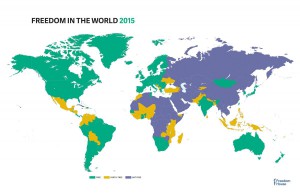


Global Democracy and freedom are under attack. Freedom House, a nonprofit organization which monitors freedom and advocates for democracy and human rights just released the 2015 “Freedom in the World” report. The results are not good. In his introduction, Arch Puddington, vice president for research says that “the condition of global political rights and civil liberties, showed an overall decline. Indeed, acceptance of democracy as the world’s dominant form of government—and of an international system built on democratic ideals—is under greater threat than at any point in the last25 years.” The report offers several examples of how citizen’s freedoms are being trampled. Just one:
In Egypt, the rise of President Abdel Fattah el-Sisihas been panied by a relentless campaignto roll back the gains of the Arab Spring. In an unprecedented trampling of the rule of law, Egyptian courts sentenced 1,400 political detainees to death in a series of drumhead trials that lacked the most basicelements of due process. Under Sisi, a once-vibrant media sector has been bent into submission, human rights organizations suppressed to the point that they can no longer operate, foreign scholars barred, and domestic critics (both secular and Islamist) arrested or forced into exile. As the year drew to a close, a court dismissed charges against former president Hosni Mubarak for the murder of demonstrators in 2011, a depressing symbol of the country’s undisguised return to autocratic rule.
Some of the developments from 2014 include humanitarian crises, the decline of internet freedom, and threats to personal autonomy:
In some cases, a tightening of government control prevented ordinary people from moving within their own country or traveling abroad. Restrictions imposed by the authoritarian governments of Egypt and Russia were politically motivated. In Liberia and Sierra Leone, authorities limited movement due to the Ebola crisis, at times using measures beyond those necessary to control the disease’s spread. The most extreme example was a 10-day quarantine on the impoverished neighborhood of West Point in Monrovia, Liberia, which according to many experts actually increased the risk of contagion. In Libya, the worsening civil war hampered internal movement. In El Salvador and Honduras, worseninggang-related violence and lawlessness limited where people could safely travel.
Disturbingly, declines in freedom have outnumbered gains:
In the conclusion, the report warns the reader to remember that democracy matters:
Antidemocratic practices lead to civil war and humanitarian crisis. They encourage the growth of terrorist movements, whose effects inevitably spread beyond national borders. Corruption and poor governance fuel economic instability, which can also have regional or even global consequences.
Will the world’s established e to recognize that the global assault on free institutions poses a threat to their own national interests? The sanctions placed on Russia by the United States, Europe, and others is a e development. They send a message that invading one’s neighbor will have repercussions. The same might be said for the coalition against the Islamic State.
Read the full report here.









